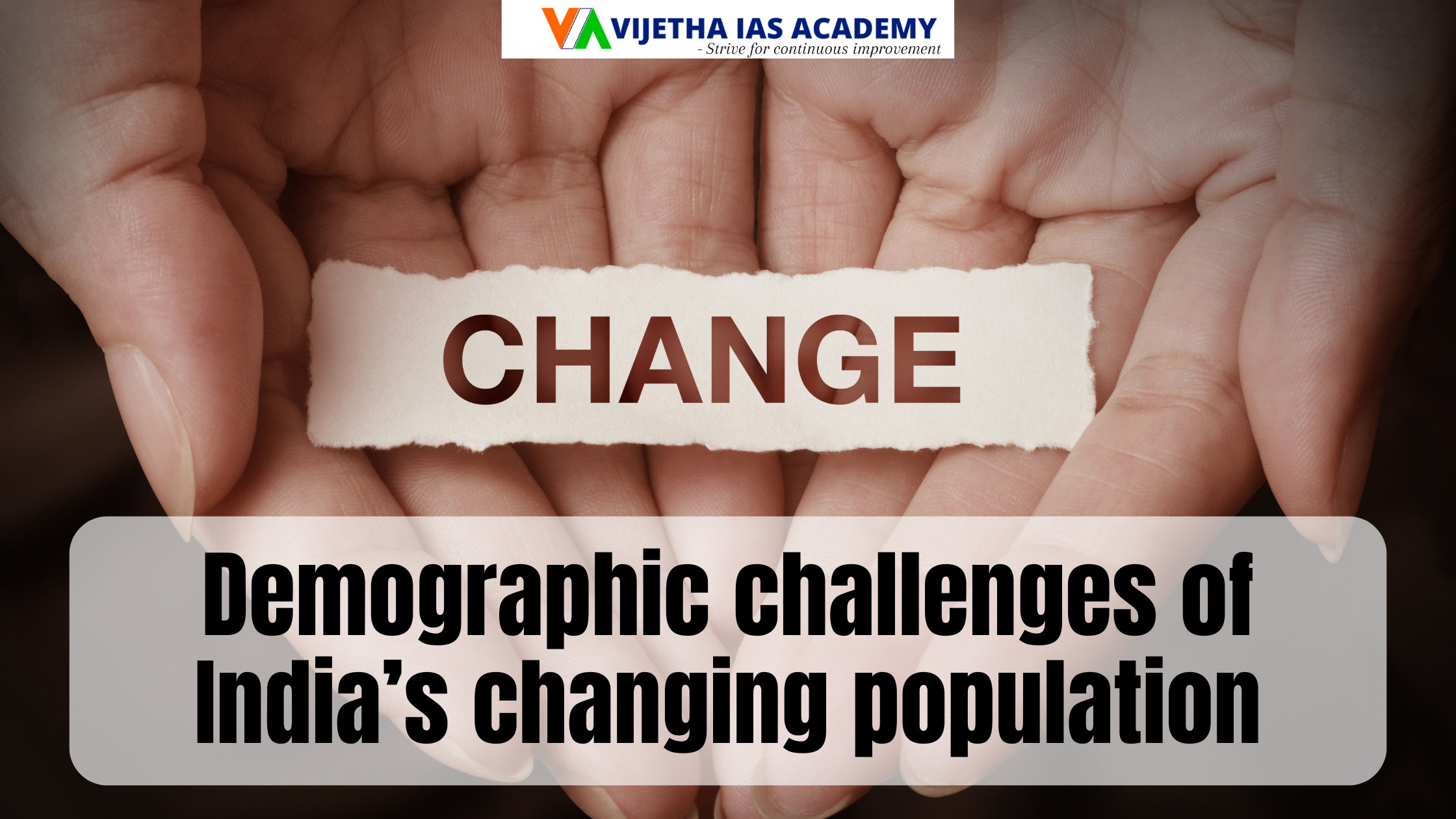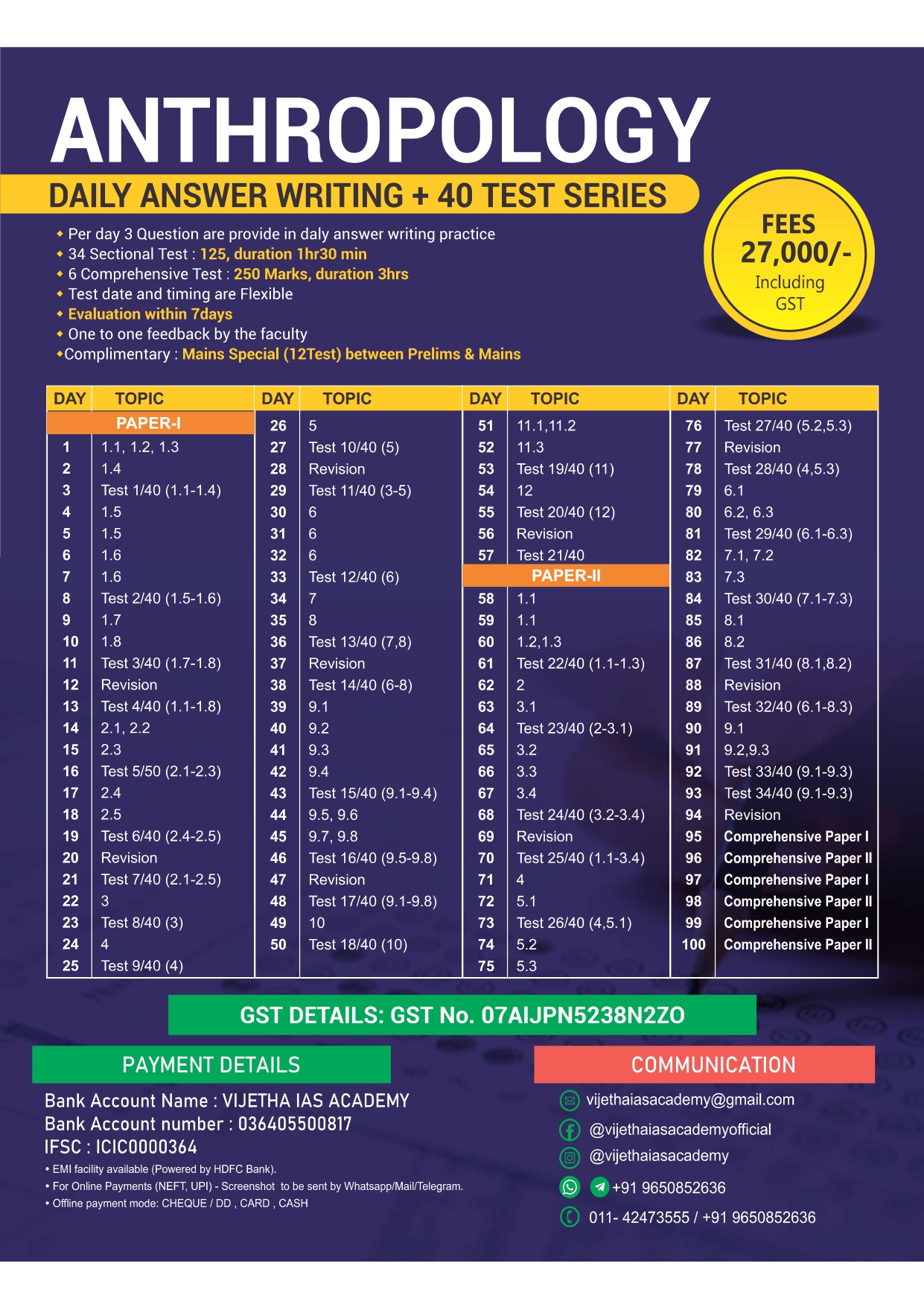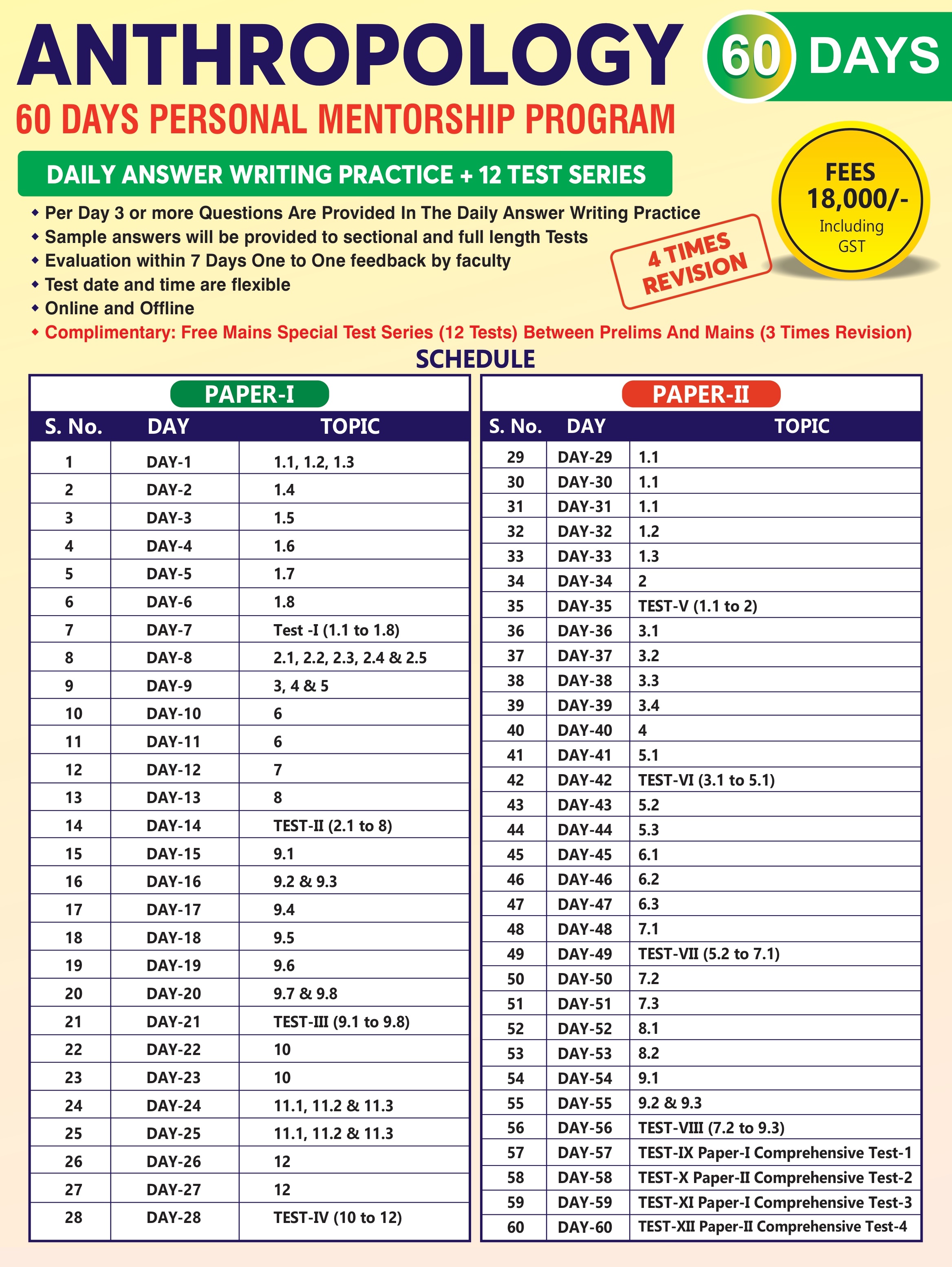
What are the demographic challenges of India’s changing population dynamics in the next 50 years?
(15 Marks) Anthropology Optional Paper CSE 2024
Introduction
India’s population dynamics are undergoing significant shifts, driven by factors such as fertility decline, rising life expectancy, urbanization, and migration. Over the next 50 years, these changes are expected to present both opportunities and challenges. As India moves from a young population to an ageing society, it will need to address demographic challenges related to economic growth, healthcare, employment, and social infrastructure. Understanding and planning for these shifts is crucial for ensuring sustainable development and improving the quality of life for all citizens.
Main Body
Ageing Population:
Increasing life expectancy and declining fertility rates mean India is likely to face a rapidly growing elderly population. By 2050, the proportion of people aged 60 and above is projected to reach nearly 20% of the total population.
Challenges: An ageing population will strain healthcare systems and social security mechanisms, particularly in a country with limited pension coverage. The rise in age-related diseases, such as dementia, cardiovascular conditions, and diabetes, will increase the burden on health infrastructure and require enhanced geriatric care services.
Implications: The demand for long-term care facilities, age-friendly infrastructure, and financial support systems for the elderly will grow. Managing this demographic transition will require reforms in healthcare, social security, and elderly care sectors.
Declining Fertility and Workforce Shrinkage:
India’s total fertility rate (TFR) has steadily declined, nearing the replacement level of 2.1 children per woman. While this marks a success in population control, it also poses a risk of workforce shrinkage in the long term.
Challenges: A reduced working-age population (15-59 years) will impact economic productivity and growth. As the dependency ratio increases, fewer workers will be available to support the growing number of elderly dependents, creating financial pressure on families and the state.
Implications: To mitigate this, India will need to focus on productivity gains through automation, skill development, and encouraging female labor force participation. Additionally, policies to support immigration could help sustain the workforce.
Urbanization and Migration:
India is experiencing rapid urbanization, with nearly 50% of the population expected to live in urban areas by 2050. This growth is driven by rural-to-urban migration, as people seek better economic opportunities.
Challenges: Rapid urbanization will strain urban infrastructure, leading to challenges such as housing shortages, traffic congestion, and inadequate sanitation and water facilities. Unplanned urbanization can exacerbate inequality and create slum-like conditions in cities.
Implications: Managing urbanization requires a focus on sustainable development, including the expansion of smart cities, affordable housing, and sustainable transportation systems. Urban planning must prioritize inclusive growth to ensure equitable access to resources and services for migrants and the urban poor.
Youth Bulge and Employment:
Currently, India has a youth bulge, with a large proportion of the population below 30 years of age. While this presents a potential demographic dividend, it also poses challenges related to employment and education.
Challenges: Creating adequate employment opportunities for the millions of young people entering the labor market will be a major challenge. Unemployment and underemployment could lead to social unrest and disillusionment among youth if not adequately addressed.
Implications: India must invest in education, skill development, and vocational training to align the workforce with the needs of the future economy, particularly in sectors such as technology, manufacturing, and green energy. Encouraging entrepreneurship and startups will also be key in absorbing the large youth workforce.
Regional Population Disparities:
India’s demographic patterns are not uniform across regions. Southern states like Kerala and Tamil Nadu have already achieved low fertility rates and face the challenge of an ageing population, while northern states like Uttar Pradesh and Bihar continue to have higher fertility rates.
Challenges: Regional disparities in population growth can lead to unequal development and resource allocation. States with slower population growth may face a shrinking workforce, while others with high fertility rates may struggle with providing adequate healthcare, education, and employment opportunities.
Implications: Addressing these regional disparities will require state-specific policies focusing on local needs, including promoting family planning in high-growth regions and economic reforms in states facing demographic stagnation.
Healthcare and Infrastructure:
The increasing demands of a changing population structure will place pressure on India’s healthcare system and social infrastructure. Both urban and rural healthcare services need to be expanded and made more accessible to handle the rise in non-communicable diseases and age-related health issues.
Challenges: Insufficient health infrastructure, especially in rural areas, and unequal access to healthcare services pose serious challenges. Rising healthcare costs and the need for comprehensive health insurance systems are also major concerns.
Implications: Improving healthcare services, ensuring universal health coverage, and increasing investment in public health infrastructure will be essential for managing the healthcare demands of the next 50 years.
Conclusion
India’s changing population dynamics in the next 50 years will present both opportunities and significant demographic challenges, including an ageing population, a shrinking workforce, urbanization pressures, and regional disparities. Addressing these challenges requires a focus on sustainable development, healthcare reform, skill development, and regional planning. To maximize the demographic dividend and prepare for an ageing society, India must adopt comprehensive policies that foster inclusive growth, enhance human capital, and ensure equitable distribution of resources across regions. Proactive planning will be crucial for India to harness its demographic potential and mitigate the socio-economic consequences of these transitions.
Anthropology Test Series Programme (Online + Offline))
We provide Anthropology Daily Answer Writing a range of programs designed to cater to various stages of UPSC preparation. Whether you're just starting out, have attempted the Mains before, or are getting ready for Mains 2024, we have the right option for you. Allow us to assist you in choosing the course that best fits your needs.
|
Level of Preparation |
Test Series Program |
Test Series Content |
Test Schedule |
|
Self-study of Anthropology Optional |
Anthropology 100 Days Personal Mentorship Program |
Daily answer writing, 34 sectional tests, 6 comprehensive tests, and complementary Mains Special 12 tests (between prelims and mains) |
|
|
Revise whole syllabus through Daily Answer Writing Practice and Tests |
Anthropology DAW Mentorship Program |
Daily Answer Writing Practice and 8 sectional and 4 Full Length tests |
|
|
Revise whole syllabus through Sectional and Full Length Tests |
Anthropology Tier- I T-40 Test Series |
34 Sectionals and 6 Full Length Tests |
|
|
Written Mains earlier and need more practice |
16-Anthropology Tier II Test Series |
10 sectional and 6 Full-Length Tests. |
|
|
Cleared Prelims 2023 and are preparing for Mains 2023 |
Mains Special 12 Tests program |
8 Sectional and 4 Full-Length Tests |
ANTHROPOLOGY MAINS SPECIAL COURSES
Enroll in our Anthropology Mentorship Program today and take the first step towards achieving your UPSC goals!
1) If you are going for Self study of Anthropology Optional and looking for a Comprehensive Program that includes Daily Answer Writing, 34 Sectional tests, 6 Comprehensive tests, and Complementary mains special 12 tests (between prelims and mains), our Anthropology 100 Days Personal Mentorship Program is the perfect choice.
2) If you want to revise Whole Syllabus through Daily Answer Writing Practice and 8 sectional and 4 full length tests, then our Anthropology DAW Mentorship Program is the best fit for you.
3) If you want to revise Whole Syllabus through 34 Sectionals and 6 Full Length Tests then Anthropology Tier- I T-40 Test Series is for you.
4) If you have written Mains earlier and need more practice, then our 16-Anthropology Tier II Test Series is a great option. This test series includes 10 sectional and 6 full-length tests.
5) if you have cleared Prelims 2023 and are preparing for Mains 2023,our Mains Special 12 Tests program is a must-have. This program includes 8 sectional and 4 full-length tests to help you prepare for the big day.
For more information on Vijetha IAS Academy’s Anthropology mentorship programs Deatils : https://vijethaiasacademy.com/anthropology-test-series
Anthropology 100 Days Personal Mentorship Program ( 7 + 3 Times Revision )

Anthropology 60 Days Personal Mentorship Program ( 4 + 3 Times Revision )

For more information: https://vijethaiasacademy.com/anthropology-test-series
Details Of Anthropology Classes Program
Top Anthropology Optional IAS Coaching Center in Delhi Vijetha IAS Academy | Best Anthropology Optional IAS Coaching in Delhi
Fee Structure:
- Tier 1: Rs. 55,150/- (3 Years Validity of Offline/Live Batch)
- Tier 2: Rs. 42,000/-
- Tier 3: Rs. 36,000/-
Batch Size: 50 – 60 Students
UPSC Notes
Anthropology Optional IAS Coaching Notes, IAS Exam Preparation Booklets, IAS optional coaching Notes, UPSC Coaching Notes, Video Lectures, Live Classes with faculty, Chat Facility Available
Teachers Name: N P Kishore Sir
Past Result
- Last Years Result 2023
- 35 Total Selections in CSE 2023
Google Reviews: 4.9 out of 5 stars
Website: Vijetha Anthropology Optional IAS Coaching in Delhi (https://vijethaiasacademy.com)
Faculties of Vijetha IAS Academy
- N P Kishore Sir
Features
- Vijetha IAS Academy offers Online and offline Courses for better preparation of Anthropology Optional Strategy for UPSC in Delhi.
- For better Anthropology optional Exam Preparation, Vijetha IAS Academy Delhi Conducts the Motivational IAS Session.
- Vijetha IAS Academy provides you with the CASE STUDIES on the pattern of the real-time IAS Exam which is helpful for better preparation of the Best Coaching for UPSC Anthropology Optional Optional IAS Examination.
- DAW & WAW – Revision Through Daily & Weekly Answer Writing Practice is offered by Vijetha IAS Academy for better result of the Anthropology Optional IAS examination.
Advantages of joining Vijetha IAS Academy
- Best Faculties for Anthropology Optional IAS Coaching in Delhi
- Best facilities, infrastructure and updated Case Studies Booklets and Notes for better preparation of the Anthropology Optional IAS Examination in Delhi.
- Best result in Past years for Anthropology Optional Strategy for UPSC Examination in Delhi
- Best Rated coaching institute for Anthropology Optional IAS Examination in Delhi.
- Vijetha IAS Academy also provides recorded lectures videos, notes which is very helpful for better preparation of Anthropology Optional IAS Coaching in Delhi
Fees Structure of Vijetha IAS Academy
|
Tier 2 |
Tier 1 |
Tier 3 |
BATCH STARTS FROM |
|
42,000/- |
55,150/- (3 Years Validity Offline/Live Batch) |
36,000/- |
REGISTRATION – START |
Fees Structure of Vijetha IAS Academy
|
Course Name |
Fees Amount |
Course Duration |
|
GS Offline (Pre + Mains+ CSAT) with Essay+Answer Writing |
Rs.99,000 (Including GST) |
400+ Days |
|
GS Online |
Rs.18,999 (Including GST) |
400+ Days |
|
GS Mentorship Programme |
Rs.29,999 (Including GST) |
1 Year |
For more information on our courses, visit our Anthropology Courses page. Explore our Test Series and Online Courses for flexible learning options.
Vijetha IAS Academy
Add. 2nd Floor, 50, Shankar Road, Block 7, Old Rajinder Nagar, Rajinder Nagar, New Delhi, Delhi 110060
MOB. 096508 52636
Open 7 Am: Closes 9 PM
Keywords: Synergistic Effects of Biological and Cultural Factors in Human Evolution , anthropology 2024 question paper, Anthropology optional subject question paper 2024, Anthropology optional 2024 question paper, Anthropology Optional Coaching UPSC, Vijetha IAS Academy Anthropology, Anthropology crash course UPSC, Anthropology daily answer writing UPSC, Kishore sir Anthropology
